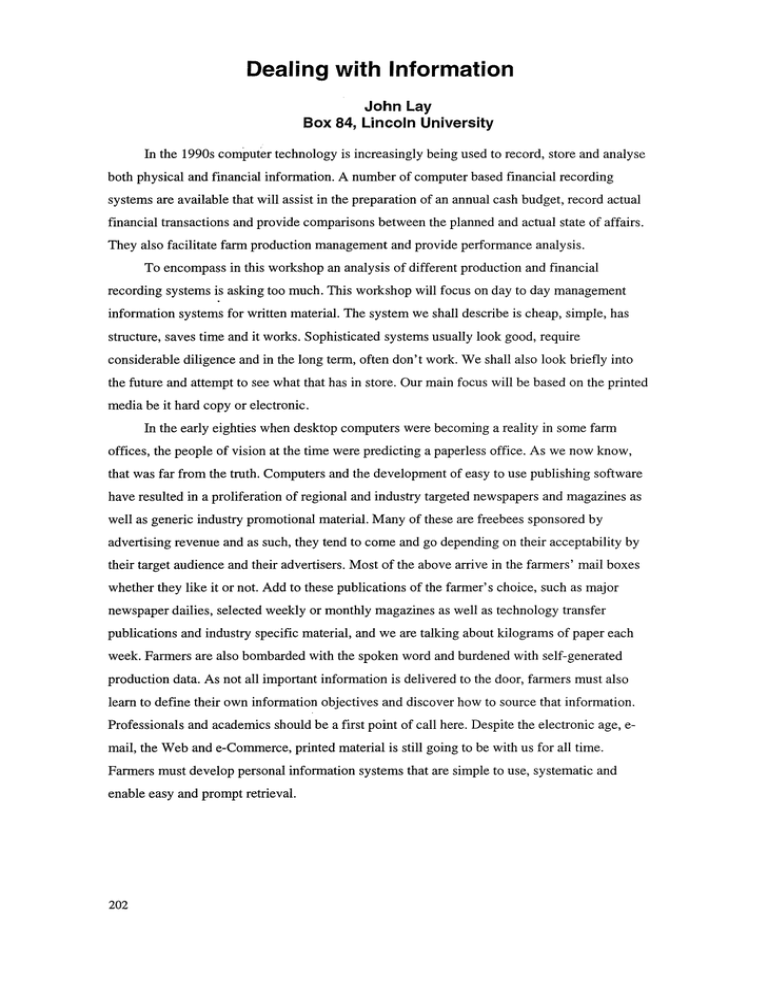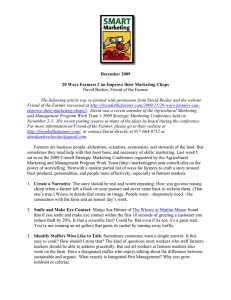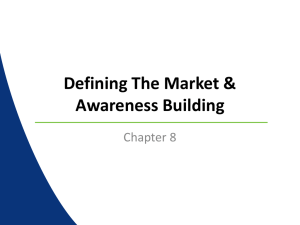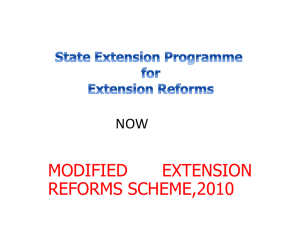Dealing with Information John Box 84, Lincoln University Lay
advertisement

Dealing with Information John Lay Box 84, Lincoln University In the 1990s computer technology is increasingly being used to record, store and analyse both physical and financial information. A number of computer based financial recording systems are available that will assist in the preparation of an annual cash budget, record actual financial transactions and provide comparisons between the planned and actual state of affairs. They also facilitate farm production management and provide performance analysis. To encompass in this workshop an analysis of different production and financial recording systems is asking too much. This workshop will focus on day to day management information systems for written material. The system we shall describe is cheap, simple, has structure, saves time and it works. Sophisticated systems usually look good, require considerable diligence and in the long term, often don't work. We shall also look briefly into the future and attempt to see what that has in store. Our main focus will be based on the printed media be it hard copy or electronic. In the early eighties when desktop computers were becoming a reality in some farm offices, the people of vision at the time were predicting a paperless office. As we now know, that was far from the truth. Computers and the development of easy to use publishing software have resulted in a proliferation of regional and industry targeted newspapers and magazines as well as generic industry promotional material. Many of these are freebees sponsored by advertising revenue and as such, they tend to come and go depending on their acceptability by their target audience and their advertisers. Most of the above arrive in the farmers' mail boxes whether they like it or not. Add to these publications of the farmer's choice, such as major newspaper dailies, selected weekly or monthly magazines as well as technology transfer publications and industry specific material, and we are talking about kilograms of paper each week. Farmers are also bombarded with the spoken word and burdened with self-generated production data. As not all important information is delivered to the door, farmers must also learn to define their own information objectives and discover how to source that information. Professionals and academics should be a first point of call here. Despite the electronic age, email, the Web and e-Commerce, printed material is still going to be with us for all time. Farmers must develop personal information systems that are simple to use, systematic and enable easy and prompt retrieval. 202 Data and information Is all the material that reaches you data or information? There is a significant difference. Data are basically unstructured materials or numbers that have been collected or supplied for future reference. This doesn't become information until it has been ordered and restructured. It is not information until the right material reaches the right person in the right form at the right time ie. it is meaningful and useful for that person when making a decision. Systems As stated earlier, there is nothing new in the proposed system. It is just a simple matter of formalising and structuring what is already there. No system will work without the user being diligent and prepared to put effort into it. Some systems just require more effort and diligence than others and that is where they often fall down. A good system requires good habits. One of these habits (work practices) for the farmer is that they should keep office hours. ie. they should be prepared to put aside time each week (say a morning) to spend in the office. This time should be used for administration, system maintenance and creative thinking. In most occupations, managers are well paid to think. Farmers tend to believe when the sun shines they should be out there doing something physical on the farm. We believe, and have good evidence to support it, that a planned management routine involving office hours unencumbered by other activities will make you a more successful all round farmer. Remember that farm management is planning, implementation and control. The time chosen for office hours should be made known to all who offer you service ie. agents, bankers- lawyers and accountants etc. Why? Because they will know that, under normal circumstances, they can contact you or call on you in your office at that time. The benefit of this is that it will minimise the disturbance of your other planned activities during the remainder of the week. Some would say the cell phone solves all of these problems. This isn't really so. Cell phone calls usually catch you out of your office away from the information you need. Another reason is that you are reacting to the beat of someone else's drum. To take control of your business, have office hours, arrange a secret calling signal on your cell phone for those whom you don't mind disturbing you, let the cellular secretary cope with other incoming calls and use your cell phone to call out and disturb others! For those random good ideas that pop into one's head (and pop out just as easily) a pocket tape recorder (less than $100) is the perfect answer. Carried at all times, in a plastic bag with rubber band keeper if necessary, this tool will store spoken information, day or night, without disturbing others in the process. Retrieval is simple. 203 Written Material To keep track of written material requires method and process. Method Printed material that comes onto the farm through the mail box should be scanned (skim read or headline read) at the very least. No farmer wants to miss out on something that may be vital to him/her. Except for urgent items, which should be read immediately (see below), scanning can be left for "office hours." In broad terms, farmers' information needs can be divided into four major categories below and subdivided a further level to add detail. This formal categorisation is the basis for a retrieval system. It needs to be thought about otherwise it will never happen. -Production -Supplementary feeding -Calf rearing -Pastures, etc -Financial -Legal -Marketing. A loose filing system is best for storing these materials into the above categories. Such systems are many and varied. We suggest using a simple concertina file for each of the main categories subdivided into the next level of categories (as per the outcome of the workshop). Concertina files are easy to store on a shelf, have a pouch format which, unlike many filing systems, prevents loose material from falling into disarray and defeating the object of the system. This feature is important in that many apparently sophisticate loose-leaf systems come to grief when data becomes dishevelled and disorderly. Process To effectively select material for inclusion in the information system from the abundance of printed material, farmers must decide if it is: -Urgent -Potentially useful in meeting their business objectives? -Credible -Important -Independent 204 In the urgent category would be the daily newspaper, weather information, market information, and financial information. Information in the urgent category must be acted upon immediately. It may be viable for one day only. Immediate action amongst the more obvious things may also include pinning the item to the office notice board or downgrading to the "office hours" process. Credibility, importance and independence don't require too much thought at this stage because reading the article in depth is not part of the process. Saving time at this point is one of the important features of the system. At this initial stage of the process, all the farmer is required to decide is whether he/she has an interest in the topic or whether the contents of the article may be potentially important to hislher business. In depth reading is only required when the article is retrieved for use. Despite what has just been said, credibility may provide good reason for dumping some publications with out the rigour of putting them through the scanning process. These decisions me enough to set the process in motion. Credibility, importance and independence will become more important when stored material is retrieved. It is then that articles should be more diligently read and examined. questions such as, " why is the writer saying this, what is the writer trying to tell me, where is the writer coming from? Does the writer have a vested or an independent intere<;t in what is being said? Is the organisation that is promulgating this information independent or not? Does what is being said or suggested sound rational to you? Applying the process requires scissors, or better still, one of those retractable razor blades (you can buy them in any stationery shop for a dollar or two). Check the back-side of the page to ensure you are not destroying the next article of interest and decide if you have the right to destroy the publication. If the answer is yes, remove the article with a flourish. Scrawling a date on it and identifying the publication will add to its credibility. If the answer is no, note the publication, date and article title for insertion in your filing system. Note, there is no still no need to put time into reading the article in full until it is retrieved. The next step of the process is to put the extracted article into the categorised concertina file and dump the rest. Retrieval is easy and quick. Some items may never be referred to again but they are there if needed. The system has no beginning and no end although the files should be purged from time to time. Don't be in too much of a hurry to remove an article though because it is difficult to know when they may become useful. Nothing new, it's all a matter of structure. The Future Computers are being used to access information and improve technology transfers using the World Wide Web. Knowing how to access and use these information sources effectively in 205 today's environment is a difficult skill, even for the best of managers. There is information overload on the Web. Most people, even the experienced, emerge with information that may be interesting but which isn't what they set out to find in the first instance in the pursuit of their business interests. Information overload on the Web is an understatement. As we speak, software and a multidisciplinary communication hub is only a month or two away. This will allow farmers to develop their personal profiles ie. I am an irrigated dairy farmer who lives in Te Pirita and supplies ABC Company. I am 38 years of age, have a teenage family, am a church-goer, have sports interests such as rugby, cricket and netball. Am interested in dairy marketing information and any technology transfer relating to my business etc. No skill will be necessary. As you sleep, the system will do the hard work for you. Next day the computer will be ready to present its stuff. It will have accessed all the information relating to your personal profile, including reports from the milk company, compared and analysed numerical data in combination with your day to day on farm production recording system and assembled your personal news for you. It will also alert you to local church services, district meetings and secondary school working bees plus a bulletin board about other activities in you district. Like the simple manual data system outlined previously, the elements of this system are already there. On this occasion however the system provides the diligence and the structure. Don't throwaway your concertina filing system. There will always be a need to produce hard copy and the old concertina filing system will still serve you well. Workshop Summary. Dealing with Information Key points of discussion • • • • • • • • • • 206 Currently we are entering the Information Age and Superhighway with the Internet. We are information junkies and we are overloaded with information. The perception is that information is power. Presently we are in a transition period where we still receive hard copy information through the letter box but also some of us receive digital information in varying ways: disk, email or internet. Dealing with all this information is both, time consuming and stressful. What information is relevant? How do I know what is or isn't? Only you can decide if the information is relevant and important to retain. Ways of dealing with information. 1. Look at all hard copy information received. This should be a quick scan to determine relevance and level of importance. 2. Sort/filter selected data. 3. Record and store key points of relevant data. 4. Recall and apply information when required. The above process needs to be systematic in approach and carried out on a regular basis, e.g. Daily or weekly etc. Any information in a magazine needs either to be photocopied, cut out or computer scanned for future recall. One tip to help out, is the use of a DayBook. This is A4 size hard cover book. All daily information is entered into this book. For this to work the daybook needs to go everywhere with you. Future thoughts • The development of network systems will be even more important. As no one person will be able to be completely up to date on all topics. • Information providers will develop systems that will provide you with as much relevant information as possible covering as much diversity as possible. This will mean you won't have to search for information. A one-stop shop so to speak. This process will occur and it will be in the next 2-5 years. • Home technology is increasing and in the future your television will become your computer, telephone, Internet access, and home entertainment center. 207


